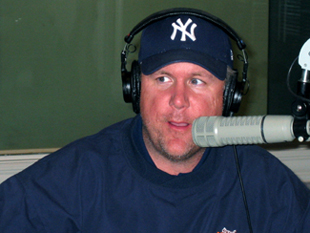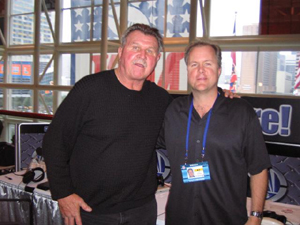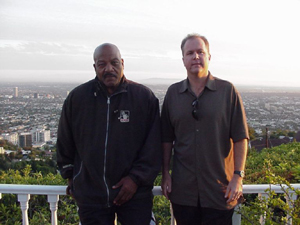Radio Host JT the Brick Could Be the Hardest Working Man in Sports
He might be the hardest working guy in sports media today, which quite frankly, isn’t all that surprising when considering how J.T. “The Brick” managed to become one of the top sports talk hosts on radio today.
After graduating with a degree in communications from Geneseo State University, J.T., also known in real life as native New Yorker John Tournour, landed a job on Wall Street of all places at the ripe age of 21.
“I didn’t want to start at the bottom of a TV or radio station,” Tournour explained about not going directly into broadcasting. “All I had to do was study for a test and get a license, and boom, four or five months later I was making money selling stocks.”

Tournour would eventually move out west to Southern California to work for Merrill Lynch, and it was then that he fell in love with sports radio, and Jim Rome in particular. “The Brick” emerged as one of Rome’s most popular callers, eventually seeing his life change one day in April of 1995 when he won Rome’s first-ever “Smak Off” for the best call of the year.
Shortly after winning the “Smak off,” KMAX, an all-sports radio station in Los Angeles, hired Tournour to do a 10 p.m. to midnight show on Sunday nights.
In order to do the show, Tournour would drive 2 ½ hours each way, back and forth to Pasadena from his home in San Diego County. He would arrive home at 2:30 in the morning, knowing he would have to be at work as a stockbroker just four hours later.
While the show was an immediate hit, Tournour ran into trouble just 10 weeks after first going on to the air.
In trouble financially, KMAX decided to plug into Las Vegas-based SportsFan Radio Network, instead of hiring talent for the late night and weekend shifts.
“They just came to me and said, ‘Hey J.T., we’re going with SportsFan Radio Network,’ ” recalled Tournour. “I was like, ‘What are you talking about? I built this whole thing up. It’s huge.’ ”
One week after hearing the news that he was out, Tournour approached KMAX with the idea of selling his own advertising to keep the show on the air.
“They said, ‘We didn’t think you wanted to do that,’ ” he recalled. “I’m like, ‘What are you kidding? I’ve been driving five hours in the middle of the night to do a show. Why didn’t you offer that to me? Why did you pull me off the air and make me look like an idiot?’ ”
Utilizing his sales skills, Tournour persevered and quickly found a sponsor, and soon his show, “The Brickhouse,” found its way back to the airwaves. He would eventually take his show closer to home to KFMB in San Diego.
It didn’t take long for program directors all across the country to begin taking notice. Within one year of winning the Smak Off, Tournour landed a full-time sports radio gig on, ironically enough, the SportsFan Radio Network, where he went on to spend five years building the largest syndication network at night in sports radio.
“For a long time, people referred to me as the Jim Rome caller, and I was proud of that,” said the 40-year-old father of two. “That was a really big deal with my life and if that didn’t happen, I wouldn’t be on the radio today.”

Just four years ago, Tournour began working for Fox Sports Radio, which is syndicated by Premier Radio Network, a subsidiary of Clear Channel, the largest radio company in the world.
“It’s been a success story and it happened pretty quick, but it’s been a lot of nights on the radio paying dues,” he said. “I don’t think there’s been a guy that’s been on the radio more hours in sports radio than me over the last decade or so.”
“The Brick’s” show airs every weeknight on Fox Sports Radio.
“I’m on at night because that’s where you need to be when you’re syndicated,” he explained. “I’ve had to make the decision, but it’s one that I’m comfortable with, that I’d much rather be on nationally in 175 markets like I am now, than broadcast in one market during the day.”
Tournour says that being on nationally allows him to switch gears every night and not be pigeon-holed as he would be broadcasting in a local market.
When he first hit the airwaves, “The Brick” said that one of his biggest challenges was getting listeners to believe that he was capable of hosting his own show.
“I think people just thought I was going to be some caller who got on the air and said, ‘Hey, this is J.T., give me a call,’ ” he said. “You can’t do that on the radio. You get thrown right out.”
It didn’t take long for listeners to realize that Tournour was more than capable. What many failed to realize was that while “The Brick” was achieving stardom as a caller, he was also quietly auditioning for his true calling in life.
“It was training me how to be organized when the spotlight was on,” he explained. “It was giving me tremendous experience.”
Tournour also credits his days as a businessman for giving him an edge over the competition.
“That really helped me,” he said. “When I got into radio, I didn’t treat it as a job, I treated it as a career, and a big part of the career is being able to connect with advertisers and affiliates and find a way to bring in business. All of that came from my years as a businessman growing up working 100 percent on commission as a stockbroker.
“Look, if I had gotten into this business when I was 21 years old, I would have been a train wreck. I would have wanted it all too quickly, and you’re seeing that now today in the business. There’s no new talent coming up because everybody wants to take a short cut.
“You’re seeking all these bombastic FM talk radio guys who want to get into sports radio and they want to go immediately to the top and pass over five guys like me, and Tony Bruno, and Jim Rome, and they think that it’s their right to have their own sports talk show and not talk sports, but just do guy talk. I’m trying to keep my focus on the sports side of it, because I think that’s a niche that people are starting to forget about.”
Having lived the life of a caller, Tournour says that has always held an edge unfamiliar to most talk-show hosts.
“A lot of people take the callers for granted,” he said. “These other shows, they don’t realize how good these guys are. My attitude is, if I’ve got a good caller on hold, do you want to listen to me or the caller?
“I should be saying me, but no, I’m at a point where hey, if I’ve got some great guy who’s totally fired up, foaming at the mouth, I’m getting right to his call.
“I love that man, because that’s what I used to be like. I’d have the most unbelievable blast in front of me and I’d be on hold and they wouldn’t go to me, wouldn’t go to me, then go to a commercial, and I’d be like, ‘Dude, you won’t believe what I’m about to say.’ ”
While J.T. said he is proud of his past as a caller, he acknowledged that he has been told more than once by people in the sports radio business to disassociate himself from his past.
“I’ve kind of come full circle,” he said. “I spent a lot of years trying to get away from that, but I kind of enjoy the fact that people respect me because they remember that I was that guy that used to sit on hold. And that’s what I respect the most about this business. Back then, the only way that I could get my opinions out was by calling into sports radio. Now, as I’m sitting here, I have a complete understanding of the people on the other end and I don’t want to lose that edge.”

Tournour says that he is pushing interaction with his audience more than ever these days, and he’s utilizing the Web to connect with his fans. He said that being able to blog on his own Web site is an opportunity that he takes full advantage of whenever time allows.
“It’s an opportunity for me to get my opinions out there when I’m not on the air,” he explained. “I’m only on the air four hours a night, so if something breaks or there’s something that really gets me going, I can get it out there.”
He goes as far as to tout his program as “sports radio’s most interactive show,” and much of that has to do with his ability to relate to his fans better than the average host.
“Unlike other shows that don’t interact and the host is talking the entire time, mine’s the opposite,” he explained. “I’m trying to get fans to interact and get involved. I think fans are getting pushed aside when it comes to sports talk radio. Fans are kind of being told that it’s a privilege to call into a show. I treat it like it’s a privilege to have people wanting to call into my show.
“More and more of my colleagues in the business don’t go to sporting events. I go to these events because I want to be able to talk about it on the air, instead of just watching the highlights on SportsCenter and acting like I know it all. They don’t respect their audience, they leave their callers on hold for an hour, and they think that their time as a host is more valuable than other people’s time. Most people have busy lives too.
“We’re in a lucky business. It shouldn’t be too tough for people in this industry to recognize the fact that we get paid a lot of money to connect with sports fans.”
One of Tournour’s more recent ways of connecting with sports fans has been through his discovery of NASCAR.
“I found out about three of four years ago that you had to be part of NASCAR if you wanted to be legit on the radio or in sports,” he said. “I’ve gone to the races, I’ve connected with the fans in the infield, the drivers, and I’m hooked on it. I’ve always tried to find that intensity of a Yankees game or a Raiders game, and NASCAR has delivered that for me.”
Calling it a perk “that he doesn’t take advantage of,” Tournour said that one of his greatest joys has been developing close friendships with athletes, including some of the greatest legends in the history of sports.
“There’s nothing like meeting an athlete who has their priorities in place and is a good role model,” he said. “To say that I’m literally friends with Joe Montana, Pete Rose and Jim Brown, that’s been a really nice experience for me.”
In fact, Tournour is the only sports talk show host in the country with an exclusive contract with Brown, who is a weekly guest on the show.
“I’m very proud of the fact that I’m able to put money into Jim Brown’s pocket — the greatest football player ever,” J.T. proclaimed.
Tournour says he gets asked often by broadcasting hopefuls about the best path taken to reaching the airwaves.
“In sports radio, your education doesn’t mean a thing,” he said. “You can be a four-year graduate of Syracuse’s communication school and that is not going to make you better on the air. There are no short cuts. You have to log the hours on the air until you feel comfortable talking about anything.”
Tournour knows plenty about logging hours on the air. At one time, he was broadcasting an unheard of eight hours per day.
“It’s all paying off now,” he said. “I’ve got a job that I love and I’m working for a company that I love.”
In recent years, Tournour has started to develop a television resume. Every Tuesday, he flies from his Los Angeles home to the Bay Area to host a television show for the Oakland Raiders. He is also a regular contributor to Fox News and MSNBC and says that his busy schedule does not impact his nightly radio show.
“For me, the biggest challenge is planning my schedule, because other than that, it’s very easy to do a sports talk radio show,” he said. “There aren’t any challenges with regards to finding things to talk about and being prepared. It’s more of what to turn down, what not to concentrate on, and where to focus my energy.”
As for the future, “The Brick” says that he wants to continue increasing his presence on television, as well as keep building what is already the largest syndication network of sports radio at night.
“My goal when I first got into this business was to be the biggest in the history of sports radio,” he said. “Maybe I won’t accomplish that goal, but I still haven’t lost the ability to think that I’m going to do that.”
Recommend0 recommendationsPublished in Features, Sports


Responses